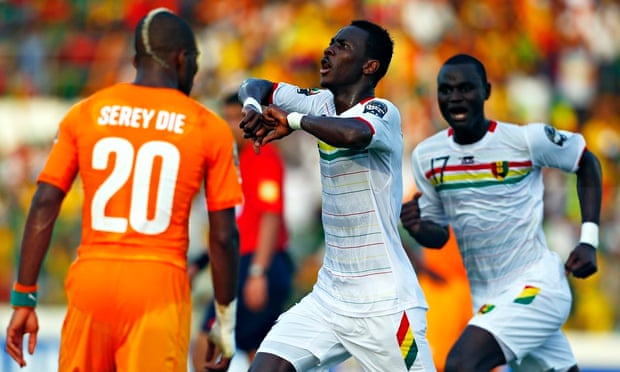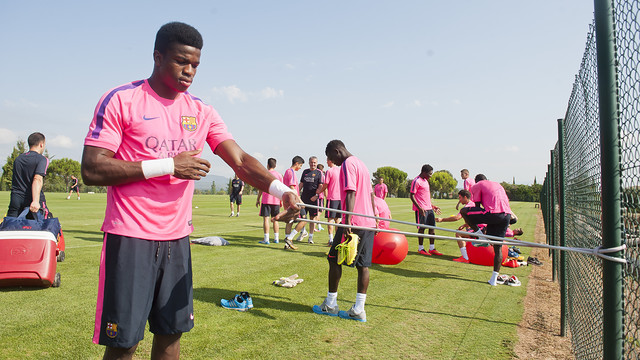CONTINENTAL FINALS FURTHER INDICTMENT
OF LOCAL FOOTBALL STANDARDS
As the 2015
Africa Cup of Nation progresses into the knockout stages, most Kenyan fans
of the beautiful game are growing apprehensive by the day. What is worrying is
the growing disparity in standards between East Africa in general and our nation
in particular, with rest of the continent as is evident from the ongoing finals.
The best
showing by any of the CECAFA regional affiliate countries was a triumph by
Sudan when they hosted the competition in 1970. The next best performance was by
Uganda in 1978, when they beat Nigeria 2-1 in the semi-final but lost 2-0 to the
hosts Ghana in the final but took pride in fact that their striker Phillip
Omondi was the tournament joint top scorer. Since the 1970’s, East Africa’s fortunes
as well as presence at the continental finals has been dwindling.
 |
| The Uganda Cranes at the 1978 final in Ghana. Joint top scorer Phillip Omondi, 4th from left. |
After a long
absence, Sudan made two recent appearances in 2008 and 2012, while Ethiopia did
the same in 2013 with both taking early flights home. Kenya has made five
appearances, but their best showing was way back in 1972 when
they lost the first game against the hosts Cameroon, then registered two, 1
all draws against Mali and Togo. At their next four appearances, Kenya
registered one win and a draw (0-0 against Cameroon in 1988, 3-0 against
Burkina Faso in 2004), losing all other matches.
Their
southern neighbours Tanzania, had their one and only finals appearance in 1980
in Nigeria while Rwanda made a brief cameo in 2004.
Why the
dismal record compared to other regions?
Is it a lack of talent, poor
infrastructure, lack of resources, and lack of structures for youth development
or poor management and apathy from the political class?
Like the rest
of the continent, East Africa is just as endowed with natural talent and the
state of infrastructure is much the same in most of Sub-Sahara Africa, with the exception of South Africa. The general organization of the game in North Africa is closer to European standards. As far
as resources are concerned, both Sahelian countries that've made great in-roads in recent years for example; Burkina Faso and Mali are some of the poorest nations
on earth and wouldn’t rank near most of the East African nations, economically.
Lack of
structures for nurturing young talent, poor management and apathy from the political class may
be more likely of reasons, more so, the former! North and West African
nations have over the decades invested heavily in youth development, regularly
appearing and performing well at FIFA youth tournaments.
Guinea was
a strong football nation in the 1970’s, slumped in the 1980’s then had a resurgence in the
1990’s. On sensing a dip in standards following a
string of poor results at the dawn of the new millennium, the Guinean government didn’t hesitate to dissolve the Guinean Football
Federation, a move that incurred a two year ban from FIFA.
During the duration of
the ban, the government cleaned up house and their rejuvenated Sylli Nationale
subsequently made it to the 2004 finals in Tunisia where they bowed out at the quarter
finals. They have since participated at every AFCON.
Kenya's Sports Minister during the post Moi era NARC government, Najib Balala attempted to emulate Guinea in 2003 by cleaning the Kenya Football Federation but the dichotomous nature of Kenyan politics ensured he didn't pull through with this move, no attempt has since been made by the political class to fix ailing state of the game, hence the aforementioned apathy.
Kenya's Sports Minister during the post Moi era NARC government, Najib Balala attempted to emulate Guinea in 2003 by cleaning the Kenya Football Federation but the dichotomous nature of Kenyan politics ensured he didn't pull through with this move, no attempt has since been made by the political class to fix ailing state of the game, hence the aforementioned apathy.
 |
| The Sylli Nationale; Captained by Titi Camara (front row centre) before their ban by FIFA in 2001 |
Another question
that is surely ringing in the minds of all Kenyan fans of the beautiful game is
whether the football fathers in this country are watching the ongoing finals
and if so, what in heaven’s name is going through their heads!?
One must
wonder, because any long time follower of the game in this country can recall for
example when Kenya was a tinge better than Zambia in the early to mid 1980’s.
What changed?
For one, the Zambians
got serious and reorganized their game in the mid eighties. To jumpstart their rise, at their last
appearance at the regional finals before they opted to pull out of the
lackluster CECAFA , later opting to join the COSAFA region, then team Captain Kalusha
Bwalya scored a hat-trick against Kenya leaving the Harambee Stars in a heap in
1984.
| Kalusha Bwalya holding the coveted prize, reaping a quarter century of hard work and dedication |
Kalusha was
to take the world by storm at the 1988 Olympics in Seoul, South Korea when he
scored all the goals as the “K.K Eleven” as they were then known, buried the Azurri’s of Italy in a famous 4-0 win! As the African Player of the year 1988, he then went on to have a
stellar career at Cercle Club Brugge in Belgium as well as PSV Eindhoven in
Holland.
From 1990,
the Zambians have participated at virtually every AFCON finals since! Moreover, to emphasize
Zambia’s seriousness in terms of management, Kalusha is currently the Chief of
the Football Association of Zambia (FAZ), as well as Confederation of African
Football (CAF) representative in FIFA’s standing committee. Kalusha’s tenure
has gone on to further propel their game and consolidate Zambia’s position in
the whole East, Central and Southern African region culminating in their AFCON
win in 2012!
With the quagmire that is Kenyan football, its next to impossible
to imagine leave alone dream of a scenario such as Zambia’s where a competent retired player of good repute is given the opportunity to run the national
office. At the moment, a protracted war between the incumbent head honcho at the Football Kenya Federation (FKF), Sammy Nyamweya and his elected deputy Sammy Sholei, a retired soccer player with Tusker F.C, resulted in Nyamweya locking out Shollei from the Federation, a move clearly detrimental and retrogressive to the Kenyan game.
Forget about
Zambia for a minute, Cape Verde have only had a competitive presence in the
African game since the year 2000 and were at their second consecutive AFCON!
Even though they can credit their current success on the Cape Verdian diaspora
in Portugal and Spain for their meteoric rise, one must acknowledge their rapid
development to proper management and goodwill of those running their game.
Other examples that would irk any frustrated Kenyan fan are Gabon, Mali and Burkina Faso who learnt from their West African brethren; Nigeria, Cote D’ Ivore, Cameroon and Ghana that the surest and simplest way out of “football limbo” is via the establishment of youth structures through which local talent is tapped, nurtured and developed to maturity. When Kenya made three consecutive AFCON finals appearances between 1988-’92; the two Sahelian countries and Gabon were languishing in relative obscurity that no one would have given them a second thought!
Other examples that would irk any frustrated Kenyan fan are Gabon, Mali and Burkina Faso who learnt from their West African brethren; Nigeria, Cote D’ Ivore, Cameroon and Ghana that the surest and simplest way out of “football limbo” is via the establishment of youth structures through which local talent is tapped, nurtured and developed to maturity. When Kenya made three consecutive AFCON finals appearances between 1988-’92; the two Sahelian countries and Gabon were languishing in relative obscurity that no one would have given them a second thought!
Mali and
Burkina Faso however embarked on serious youth programs from the late 1990’s
that has seen them become regular participants at FIFA youth World Cups. The
rest is history!
South Africa augmented their investment in youth football by launching an ambitious coaches' program five years ago via the World Football Academy among other initiatives, where SAFA raised the minimum coaching requirements. Coaching courses and regular refresher clinics are offered and all coaches are expected to have CAF and FIFA coaching certificates at the minimum. After a decade long slump, the coaching program seems to be having the intended effect. The proof is in the pudding as South Africa's football team, the Bafana Bafana proved at the AFCON. Though eliminated in the first round, the youthful South Africans were arguably the most entertaining and enterprising team during the group stages and can take plenty of positives as they are clearly a team on the rise, a course that shall reap them maximum benefits sooner rather than later.
South Africa augmented their investment in youth football by launching an ambitious coaches' program five years ago via the World Football Academy among other initiatives, where SAFA raised the minimum coaching requirements. Coaching courses and regular refresher clinics are offered and all coaches are expected to have CAF and FIFA coaching certificates at the minimum. After a decade long slump, the coaching program seems to be having the intended effect. The proof is in the pudding as South Africa's football team, the Bafana Bafana proved at the AFCON. Though eliminated in the first round, the youthful South Africans were arguably the most entertaining and enterprising team during the group stages and can take plenty of positives as they are clearly a team on the rise, a course that shall reap them maximum benefits sooner rather than later.
To illustrate
the rut in football management in this country, a decade after FIFA initiated
the Goal Project, with most countries in the continent almost reaping
dividends, the local chapter has yet to take off.
It even took the prodding of
the FIFA regional representative, Ashford Mamelodi recently to prompt the local
federation to move to the facilities at Kasarani, to prevent vandalism!
Why would
anyone then wonder why Kenya seems stuck in the 130’s on the FIFA rankings!?




